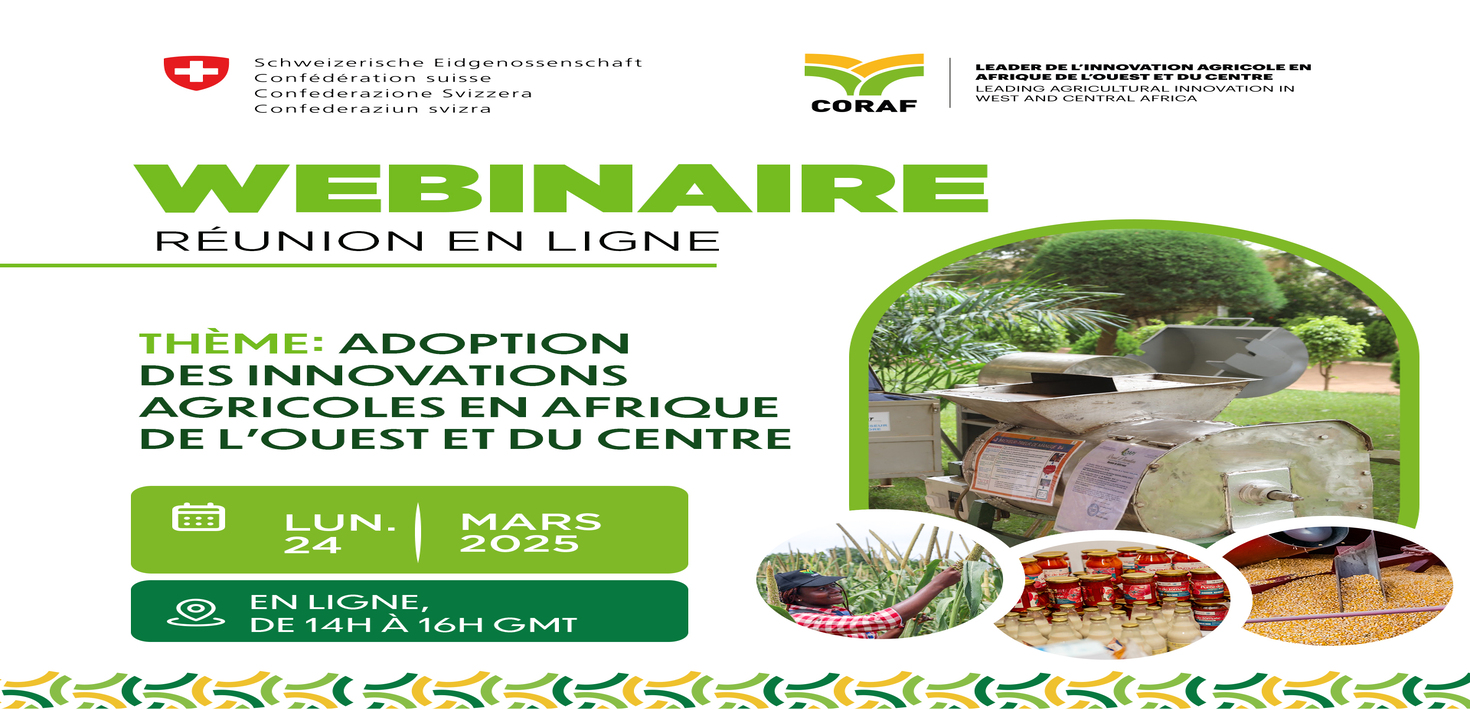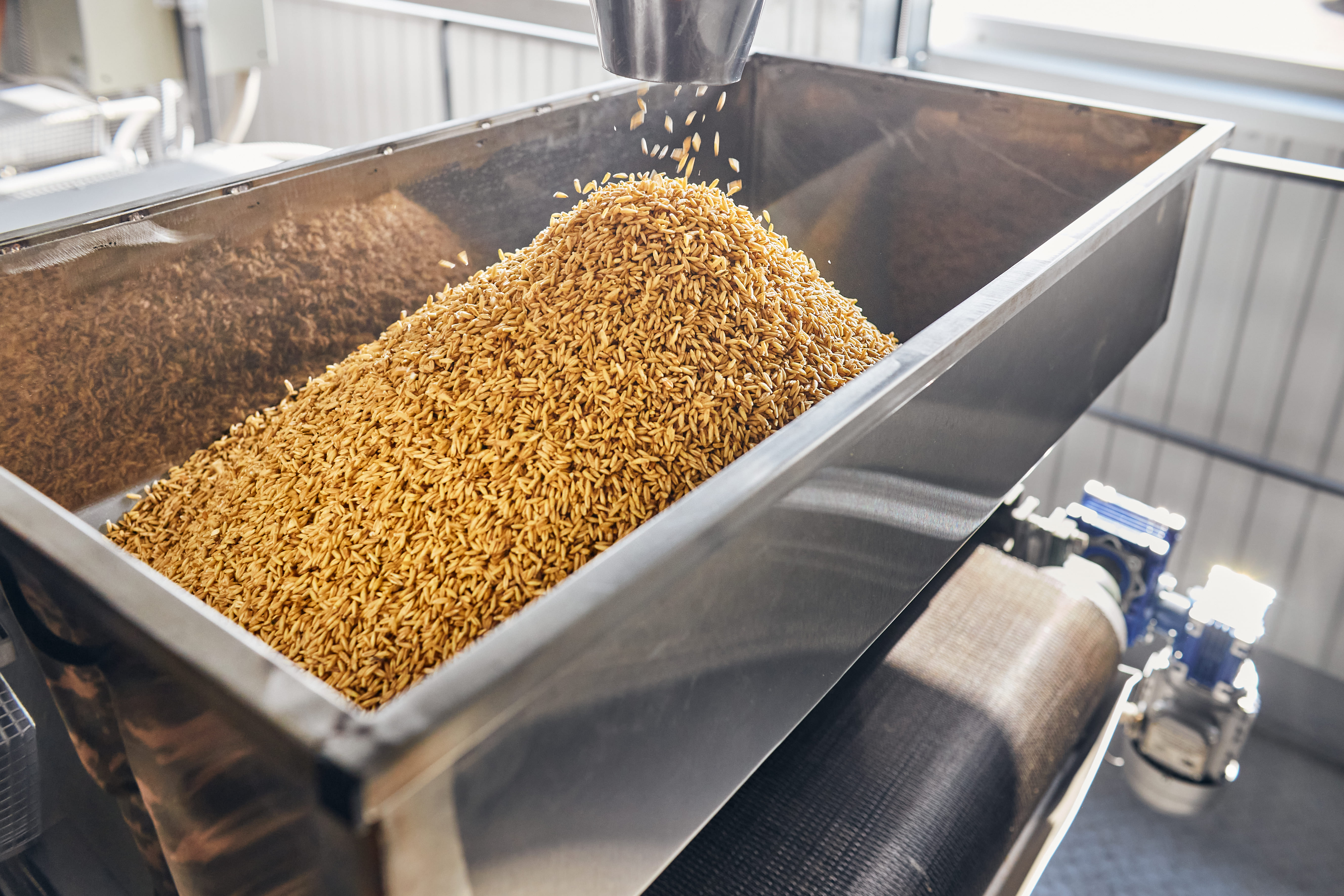News
CORAF is an important organization working to improve food and nutrition security in West Africa. CORAF's recent initiatives are a promising sign of its determination to meet the challenges facing West Africa.
CORAF and Swiss Cooperation explore new approaches to improve adoption of agricultural innovations

Published on: 26/03/2025
CORAF, in its drive to boost the development of the agricultural sector through the adoption of agricultural innovations and technologies to ensure food security, has been implementing the TARSPro project (Technologies et Innovations Agricoles pour l'Accroissement de la Résilience des Systèmes de Production et des Exploitations Familiales en Afrique de l'Ouest et du Centre) since 2021.
Financed by the Swiss Cooperation, this project, which aims to ensure food, nutritional and economic security for the populations of West and Central Africa, has promoted the development/identification and dissemination of agricultural technologies in five countries: Benin, Burkina Faso, Mali, Niger and Chad.
This project has created 10 Community Immersion Poles, 05 climate-smart villages, 33 innovation platforms, funded the research work of 45 students, listed 224 technologies and innovations, including 78 nutrition-sensitive, 64 gender-sensitive, 62 climate-sensitive, and 10 post-harvest loss management, and created 05 agricultural technology and innovation parks.
A total of 40,322 people, including 14,199 women (35%), 17,282 young people (43%) and 155 people with disabilities, were directly impacted by this project.
"The major results were the identification and dissemination of over 220 agricultural technologies and innovations, whose main features were high productivity. In other words, all these technologies have demonstrated their ability to increase yields in the targeted sectors. These technologies also met the challenges of climate change, while taking into account the gender and nutrition dimensions", explained Dr. Vianney TARPAGA, researcher at INERA and focal point of the TARSPro project in Burkina Faso.
Increase adoption of technologies and innovations
Encouraged by the results of this project, which started in June 2021, CORAF and Swiss Cooperation are working to implement a second phase of the project.
With this in mind, the two partners organized a webinar on March 24 to discuss the best strategies for boosting the adoption of agricultural innovations in West and Central Africa.
The meeting provided an opportunity for technical teams from CORAF, Swiss Cooperation and national research and beneficiary structures to discuss the challenges and opportunities associated with the adoption of innovations.
In particular, they discussed the importance of extension and producer involvement, as well as the creation of a favorable policy environment for the dissemination and adoption of agricultural innovations and technologies.

Towards a change of approach
Participants in this virtual exchange meeting emphasized the importance of putting people at the heart of innovation to facilitate its adoption.
Thus, for the next phase of the project, the importance of adopting a collaborative approach with a paradigm shift that will place beneficiaries at the center of strategies to improve food security and the resilience of agricultural production systems was emphasized.
Africa's leader in agricultural innovation and its partners will also need to step up their lobbying of political players to ensure that research and agricultural policies are linked, adopted and disseminated.
"The TARSPro project will have to work on immersing politicians, in particular ministers, MPs and central and regional service directors, to get a feel for the innovations," recommended Adama Kaboré, deputy delegate general in charge of valorization at CNRST in Burkina Faso.
During the new phase of the project, CORAF will also explore the possibility of testing technologies on a large scale before they are disseminated, while improving its mechanisms for monitoring and evaluating technology adoption and use.
"For the adoption of innovations and technologies, we need to identify the obstacles and motivations of producers in choosing whether or not to apply the technologies promoted," shared Ousmane Dembélé of the Mali-based NGO IAE.
CORAF's ambitions for TARSPro Phase 2
Based on the results of TARSPro phase 1, CORAF aims to reach 2 million climate-resilient, food- and nutrition-secure and more prosperous beneficiaries, with particular emphasis on women and young people in value chains linked to the technologies and innovations adopted and used.
In terms of technologies, CORAF has already identified the potential for scaling up 220 innovations and technologies in three areas:
- Varieties and seeds, covering both food and forage crops.
- Cattle and goat fattening.
- Vegetable varieties and seeds.
A strategy for successful scaling up
To achieve the ambitions set out at the meeting, CORAF is already considering a strategy based on several levers:
- The development of strategic partnerships with NGOs and the private sector, in particular for the animation of community immersion poles, which are a key tool for the dissemination of technologies through innovative approaches to farm advisory services.
- A better tandem with existing projects, particularly those financed by Swiss cooperation in five countries.
- Greater involvement of the private sector, in particular to develop economic opportunities around the technologies and innovations requested by beneficiaries.
- Support for agricultural advisory structures, to help family farms gain access to financing and remunerative markets, through collective product marketing mechanisms.
- Taken together, these actions will help to promote mass adoption of technologies and guarantee their use, thereby strengthening the resilience of family farms.
Other news
View allTowards a strengthening of CORAF's actions in...
A delegation from CORAF, led by its Chairman of the Board, Dr Kalifa TRAORÉ, its Executive Director, Dr Moumini SAVADOGO, and its...
A strong plea for African women entrepreneurs...
Many women in West and Central Africa live in an unfavorable environment, with limited access to information,...
CORAF strengthens its partnerships in Burkina Faso...
As part of its mission to strengthen institutional and technical collaboration, a delegation from CORAF, led by its Director,...
Training today's and tomorrow's researchers:...
When AMABA Akéta Akpadji Rébecca completed her Master's degree in Plant Biology in Togo, she was faced with uncertainties about...